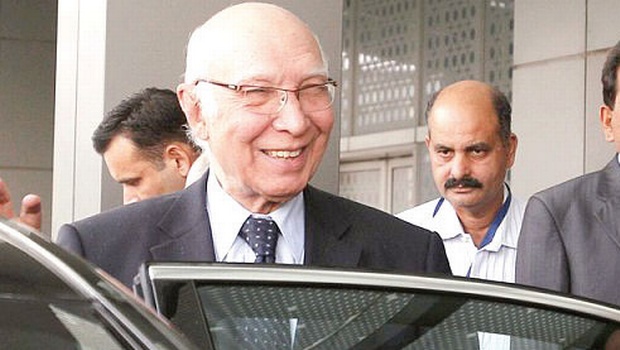So Far India-Pakistan NSA Talks On Track
Sartaj Aziz
NEW DELHI: In a case of history set to repeat itself, reports indicate that the Pakistan High Commission has invited leaders of the Hurriyat to a reception to meet with Pakistan National Security Advisor Sartaj Aziz during his visit to Delhi. The invitations have reportedly been sent out to Mirwaiz Umer Farooq and Syed Ali Shah Geelani, just ahead of talks between Aziz and his Indian counterpart Ajit Doval scheduled for August 23.
It is worth noting that India had cancelled secretary level talks -- that had been agreed to during Pakistani Prime Minister Nawaz Sharif’s visit for Narendra Modi’s inauguration ceremony -- over Pakistan’s decision to meet Kashmiri separatist leaders in August last year. “This is a red line we have drawn,” the MEA spokesperson had said at the time, “We have told Pakistan — you either talk to us, or to them.”
Sharif and Modi recently met on the sidelines of the Shanghai Cooperation Organization summit in Ufa, Russia -- with the meeting being the first of its kind between the two leaders in over a year. It was here that the two countries agreed to meetings between their respective NSAs.
The announcement of NSA talks seemed to be a step in the right direction, as relations between the two countries have been tense, with India pointing a finger at Pakistan for recent terror attacks in Gurdaspur, Punjab and in Jammu and Kashmir. The two countries have also been exchanging fire along the Line of Control, with each side blaming the other for the provocation. Things took another dip when Pakistan decided to not invite the Jammu and Kashmir assembly speaker to a conference of the Commonwealth Parliamentary Association, with India responding by deciding to boycott the meet to be held in Islamabad from 30th September 30 to 8th October.
There was also a flare up in rhetoric after PM Modi visited Bangladesh and more recently, after India’s covert operation in Burma. Another contentious issue is the release of 26/11 blast mastermind and leader of the Lashkar-e-Taiba Zakiur Rehman Lakhvi, who was recently granted bail released from Adiala Jail in Rawalpindi in April this year. In fact, when PM Modi met Chinese Premier Xi Jinping, the issue of Lakhvi’s bail was raised.
In spite of these tensions, whilst the two Prime Ministers had not met, meetings at other levels have continued. S. Jaishankar travelled to Islamabad in March this year, where he met Chaudhry and the two reportedly discussed strategies for renewing the Indo-Pak peace dialogue.
The meeting was significant as it was the first official step since India had cancelled secretary-level talks. Speaking at the UN a couple of months ago, Sharif said that India’s decision to cancel the talks had resulted in a “missed opportunity.” Modi, speaking at the UN the next day, responded saying that India was not opposed to talks, but would not participate “in the shadow of terror” and that it was upto Pakistan to “create a conducive atmosphere for talks.”
Further, tensions between the two countries have been high as border skirmishes across the Line of Control that began in late 2014, continue in 2015. The firing prompted Pakistan penning a letter to UN Secretary General Ban Ki Moon that invoked the UN to implement resolutions for a plebiscite in Kashmir. The letter marked a major reversal of Pakistan’s position for over a decade, sending bilateral relations between the two countries plummeting.
However, the first sign that the situation was changing came when Pakistan’s former National Security Adviser Major-General (Retd.) Mahmud Durrani met with NSA Ajit Doval and Foreign Secretary S. Jaishankar in March. The Citizen had the reported that the meeting could be an attempt at resuming back channel diplomacy. Although the MEA spokesperson dismissed a question in regard to whether this could pave the way for the resumption of an India-Pakistan dialogue, General Durrani was quoted by The Hindu saying that his impression is that Prime Minister Narendra Modi would “like to move forward” on the dialogue, but would rather not pick up the old format of the composite dialogue process. “Mr. Modi is a different man with a different mind and a different thinking from the previous Prime Minister,” The Hindu quoted General Durrani as saying. “I think he will probably engage with Pakistan, but he would like to do that in his own way.”
What that own way will be remains to be seen, as every time the two countries see progress on the front of dialogue, incidents -- such as the reports of invitations being sent -- exacerbate the tensions. This latest invitation to Hurriyat leaders will be seen as reaffirmation that Pakistan wants to drag the Kashmir issue into the talks, a subject that India is very clear cannot be included in the mandate, with the talks limited to discussing “all forms of terrorism.”





